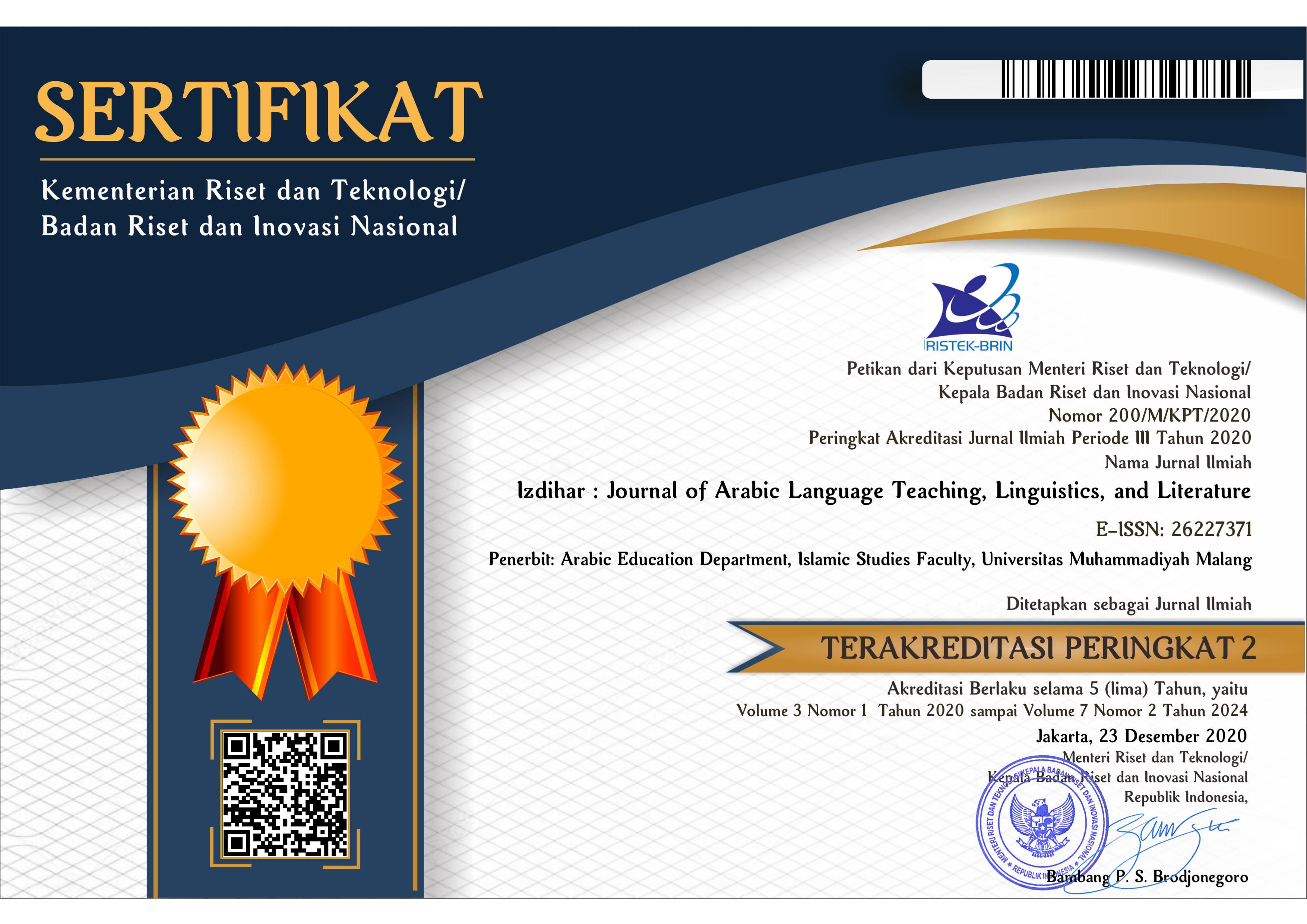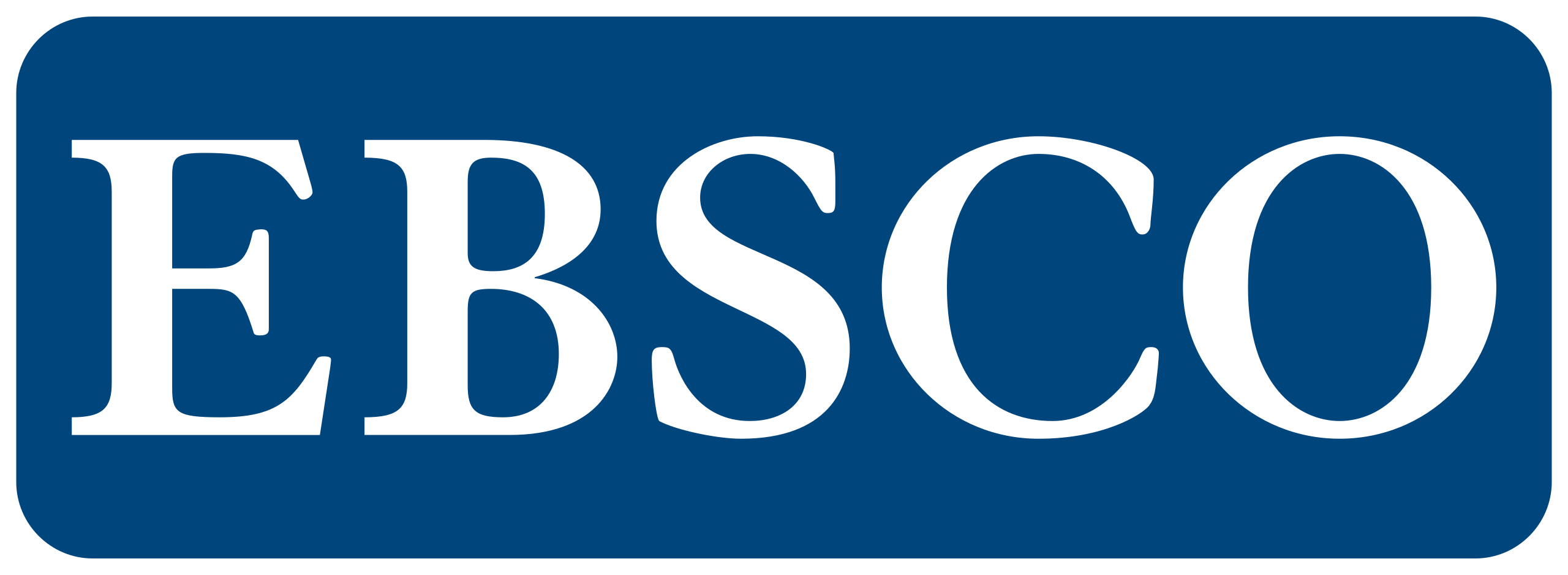Chomsky's Transformational Linguistic Theory in Writing Skill at Islamic Senior High School: Transforming Language Learning Pedagogy
DOI:
https://doi.org/10.22219/jiz.v4i2.16490Keywords:
Arabic writing skill; implementation; Noam Chomsky; transformationalAbstract
This research aimed to determine the implementation's effectiveness as supporting and inhibiting factors of Chomsky's Transformational Linguistic Theory in Writing Skill implementation. The data were collected through interviews, observations, and tests. The results of this study are: 1) the researchers obtained the difference in scores between the pretest and posttest of the control class and the experimental class. 2) there were five supporting factors and three inhibiting factors in learning maharah kitabah at MA Muallimat Malang Indonesia. The supporting factors are: 1) the transformation of sentences is easy to understand, 2) students have the ability of basic Arabic rules, 3) students can write Arabic, 4) enthusiasm in participating in learning activities, 5) availability of sufficient media for learning. Meanwhile, the inhibiting factors are: 1) the difficulty of students distinguishing mudzakkar and muannats,2) only a few materials limits transformation, 3) some students do not like to learn Arabic.
Downloads
References
Alwasilah, A. C. (1990). Linguistik suatu pengantar. Penerbit Angkasa.
Basit, Muhammad Ali Abdul & Ummah, R. P. K. (2018). Aplikasi tepori generatif transformasi dalam pembelajaran bahasa Arab di Pondok Pesantren Nurussalam Krapyak Yogyakarta. Lisanan Arabiya: Jurnal Pendidikan Bahasa Arab, 2 (2), 155–171.https://doi.org/https://doi.org/10.32699/liar.v2i02.648
Brucher, L., Ugen, S. & Weth, C. (2020). The impact of syntactic and lexical trainings on capitalization of nouns in German in grade five. L1-Educational Studies in Language and Literature, 20, 1–23. https://doi.org/https://doi.org/10.17239/L1ESLL-2020.20.01.01
Chaer, A. (2012). Linguistik umum. Rineka Cipta.
Choamsky, N. (1966). Topics in the theory of generative grammar. In Theoretical Foundations. Mouton & Co. N.V. https://doi.org/10.1515/9783110814644-002
Dalyono, M. (2009). Psikologi Pendidikan. Rineka Cipta.
Dekany, E. (2019). Foundations of generative linguistics. Acta Linguistica Academica, 66(3), 309–334. https://doi.org/10.1556/2062.2019.66.3.1
Gläser, R. (1971). The application of transformational generative grammar to the analysis of similes and metaphors in modern English. Style, 5(3), 265–283. https://doi.org/Http://Www.Jstor.Org/Stable/42945113
Henkel, J. (1990). Linguistic models and recent criticism: Transformational-generative grammar as literary metaphor. PMLA, 105(3), 448–463. https://doi.org/https://doi.org/10.2307/462894
Heny, F., & Chafe, W. (1972). Meaning and the structure of language. College English, 33(8), 908–929. https://doi.org/https://doi.org/10.2307/374931
Horrocks, G. (1987). Generative grammar. Routledge.
Imam, J., & Wildana Wargadinata. (2020). Tarqiyatu fahmi al-Mufradāti bi-sti’māli al-Aflāmi al-‘arabiyyati Li talāmīżi al-Ṣaffi al-Ṡāni bi al-Madrasati al-‘āliyati al-Hukūmiyyati al-Ṡāniyati bi Bandung. Al Mahāra: Jurnal Pendidikan Bahasa Arab, 6(1), 99-118. https://doi.org/10.14421/almahara.2020.061.06
Jamiu, F. O. (2014). A Transformational- Generative Approach towards Understanding Al-Istifham. Research on Humanities and Social Sciences, 4(10), 38–46. https://doi.org/https://www.iiste.org/Journals/index.php/RHSS/article/download/13243/13403
Johnson R. Burke & Christensen, L. (2014). Educational Research (Quantitative, Qualitative and Mixed Approaches). SAGE Publications.
Jubaidah, S., Pimada, L. H., Yurisa, P. R., & Wargadinata, W. (2020). Fa’āliyyah ta’līm mahārah al-istimā’ bi istikhdām android li al-jawwāl. LISANIA: Journal of Arabic Education and Literature, 4(1), 49-64. https://doi.org/10.18326/lisania.v4i1.49-64
Khamaliyah, S. N & Lestari, W. A. (2020). Linguistik modern (tata bahasa kasus dan transformatif generatif). Edulitera.
Khasanah, N. (2018). Desain pengembangan kurikulum pembelajaran bahasa arab berbasis pendekatan potensi/ fitrah. Al Mahāra: Jurnal Pendidikan Bahasa Arab, 4(2), 159-180. https://doi.org/10.14421/almahara.2018.042-01
Kuraedah, S. (2015). aplikasi maharah kitabah dalam pembelajaran bahasa Arab. Jurnal At-Ta’dib, 8(2), 82–98. http://dx.doi.org/10.31332/atdb.v8i2.412
Levlin, M dan Waldmann, C. (2020). written language in children with weak reading and spelling skills: the role of oral language, phonological processing, verbal working memory and reading. L1-Educational Studies in Language and Literature, 20, 1–25. https://doi.org/https://doi.org/10.17239/L1ESLL-2020.20.01.02
Maghfirah, A. F. (2017). Kreativitas dosen dalam meningkatkan minat belajar bahasa Arab Mahasiswa di IAIN Surakarta. Academica : Journal of Multidisciplinary Studies, 1(1), 19-33. http://ejournal.iainsurakarta.ac.id/index.php/academica/article/view/752
Maimunah, I. (2019). Teaching speech skills using role modeling/ Ta’lim mahaarah al-kalaam bistikhdaami thoriiqoti tamtsiili al-adwaar. Ijaz Arabi Journal of Arabic Learning, 2(1), 50-63. https://doi.org/10.18860/ijazarabi.v2i1.5792
Mariyam, S. (2021). Hubungan penguasaan nahwu sharaf dengan kemampuan membaca kitab kuning pesantren Riyadhul Huda. Tatsqifiy: Jurnal Pendidikan Bahasa Arab, 2(1), 71-81. https://doi.org/10.30997/tjpba.v2i1.2828
Maturedy, F., Nurhasanah, I., & Wargadinata, W. (2020). al-istiqāmah ad-dalāliyyah ‘inda at-tarjamah fi khittah al-buhūts li thalabah al-jāmi’ah al-islāmiyyah al-hukūmiyyah bi Jember. Jurnal Taqdir, 6 (1), 1–18. https://doi.org/https://doi.org/10.19109/taqdir.v6i1.5771
Miles B. Matthew & Huberman A. Michael. (1994). An expanded sourcebook: qualitative data analysis. SAGE Publications.
Mulyadi, M. (2020). Metode qawa’id dan tarjamah dalam memahami kitab kuning. AL-LIQO: Jurnal Pendidikan Islam, 5(01), 25-42. https://doi.org/10.46963/al.v5i01.143
Nasr, R. T. (1980). The essentials of linguistic science. Longman Singapore Publishers.
Orelus, P., & Chomsky, N. (2014). Noam chomsky and the linguistic, political, and activist world: a critical analysis. Counterpoints, 458, 23–41. https://doi.org/http://www.jstor.org/stable/42982195
Ouhalla, J. (2001). Introducing transformational grammar: From principles and parameters to minimalism. Edward Arnold.
Puspitarini, Y. D., & Hanif, M. (2019). Using learning media to increase learning motivation in elementary school. Anatolian Journal of Education, 4, 53–60. https://doi.org/https://doi.org/10.29333/aje.2019.426a
Radford, A. (1988). Transformational grammar a first course cambridge textbooks in linguistics. Cambridge University Press.
Ritonga, M. (2018). Kemampuan nahwu dan sharaf mahasiswa program pascasarjana universitas muhammadiyah sumatera barat serta pengaruhnya terhadap pemahaman kitab kuning. Konferensi Nasional Ke-8 Asosiasi Program Pascasarjana Perguruan Tinggi Muhammadiyah Dan Aisyiyah.
Riyanto, Y. (2010). Metodologi penelitian pendidikan. Penerbit SIC.
Robins, R. H. (2014). General linguistics: An introductory survey. General Linguistics: An Introductory Survey, 1–445. https://doi.org/10.4324/9781315842028
Rosyidi, A. W. & N. M. (2012). Memahami Konsep Dasar Pembelajaran Bahasa Arab. UIN Maliki Press.
Setiadi, A. C. (2005). Pengajaran bahasa dengan pendekatan komunikatif: analisis atas teori transformatif-generatif noam chomsky. At-Ta’dib, 4(1), 1-14. http://dx.doi.org/10.21111/at-tadib.v4i1.569
Singleton, J. (1974). The explanatory power of chomsky’s transformational generative grammar. Mind, 83, 429–431. https://doi.org/http://www.jstor.org/stable/2252745
Thomas, O. (1962). Generative grammar: Toward unification and simplification. The English Journal, 51(2), 94–113. https://doi.org/https://doi.org/10.2307/809936
Umar, K. (2019). Pengaruh kompetensi guru dan motivasi belajar siswa terhadap prestasi belajar siswa smp negeri 4 padangsidimpuan. PeTeKa: Jurnal Penelitian Tindakan Kelas Dan Pengembangan Pembelajaran, 2(2), 72–76. http://dx.doi.org/10.31604/ptk.v2i2.72-76
Wargadinata, Wildana, Maimunah, Iffat, Zulfiqar Bin Tahir, S., & Umanailo, M. C. B. (2020). Arabic creative and participative learning: In search of a new way of language learning by “el jidal reborn” youth community in Malang. International Journal of Advanced Science and Technology, 9(8s), 4319-4332 https://doi.org/10.35542/osf.io/54yr9
Wargadinata, W., Maimunah, I., Febriani, S., & Humaira, L. (2020). Mediated Arabic language learning for arabic students of higher education in covid-19 situation. Izdihar : Journal of Arabic Language Teaching, Linguistics, and Literature, 3(1), 59-78. https://doi.org/10.22219/jiz.v3i1.11862
Wargadinata, W., Wahidmurni, W., Abdussakir, A., Wahyuni, E., & Maimunah, I. (2019). Alternative education in the global era: Study of alternative models of islamic education in tazkia international islamic boarding school Malang. Library Philosophy and Practice. https://www.researchgate.net/publication/338965353_Alternative_Education_in_the_Global_Era_Study_of_Alternative_Models_of_Islamic_Education_in_Tazkia_International_Islamic_Boarding_School_Malang
Yadav, M. . & Y. M. . (2020). Role of the transformational generative grammar and other language learning theories in English language teaching. Electronic Research Journal of Social Science and Humanities, 2, 142–153. https://doi.org/10.2139/ssrn.3567848
Yang, Y. (2008). The importance of the teacher for developing interest in learning English by Chinese students. International Education Studies, 1(1), 95–100. 10.5539/ies.v1n1p95
Downloads
Published
How to Cite
Issue
Section
License
Copyright (c) 2021 Wildana Wargadinata, Lisa Khillatur Risalah, Ulul Elmi, Iffat Maimunah, Suo Yan Mei, Izdihar : Journal of Arabic Language Teaching, Linguistics, and Literature

This work is licensed under a Creative Commons Attribution-ShareAlike 4.0 International License.
Copyright Notice
Authors who publish with this journal agree to the following terms:
- Authors retain copyright and grant the journal right of first publication with the work simultaneously licensed under a Creative Commons Attribution-ShareAlike 4.0 International License that allows others to share the work with an acknowledgment of the work's authorship and initial publication in this journal.
- Authors are able to enter into separate, additional contractual arrangements for the non-exclusive distribution of the journal's published version of the work (e.g., post it to an institutional repository or publish it in a book), with an acknowledgment of its initial publication in this journal.
- Authors are permitted and encouraged to post their work online (e.g., in institutional repositories or on their website) prior to and during the submission process, as it can lead to productive exchanges, as well as earlier and greater citation of published work (See The Effect of Open Access).
Copyright (c) 2019 Izdihar : Journal of Arabic Language Teaching, Linguistics, and Literature

This work is licensed under a Creative Commons Attribution-ShareAlike 4.0 International License.

















